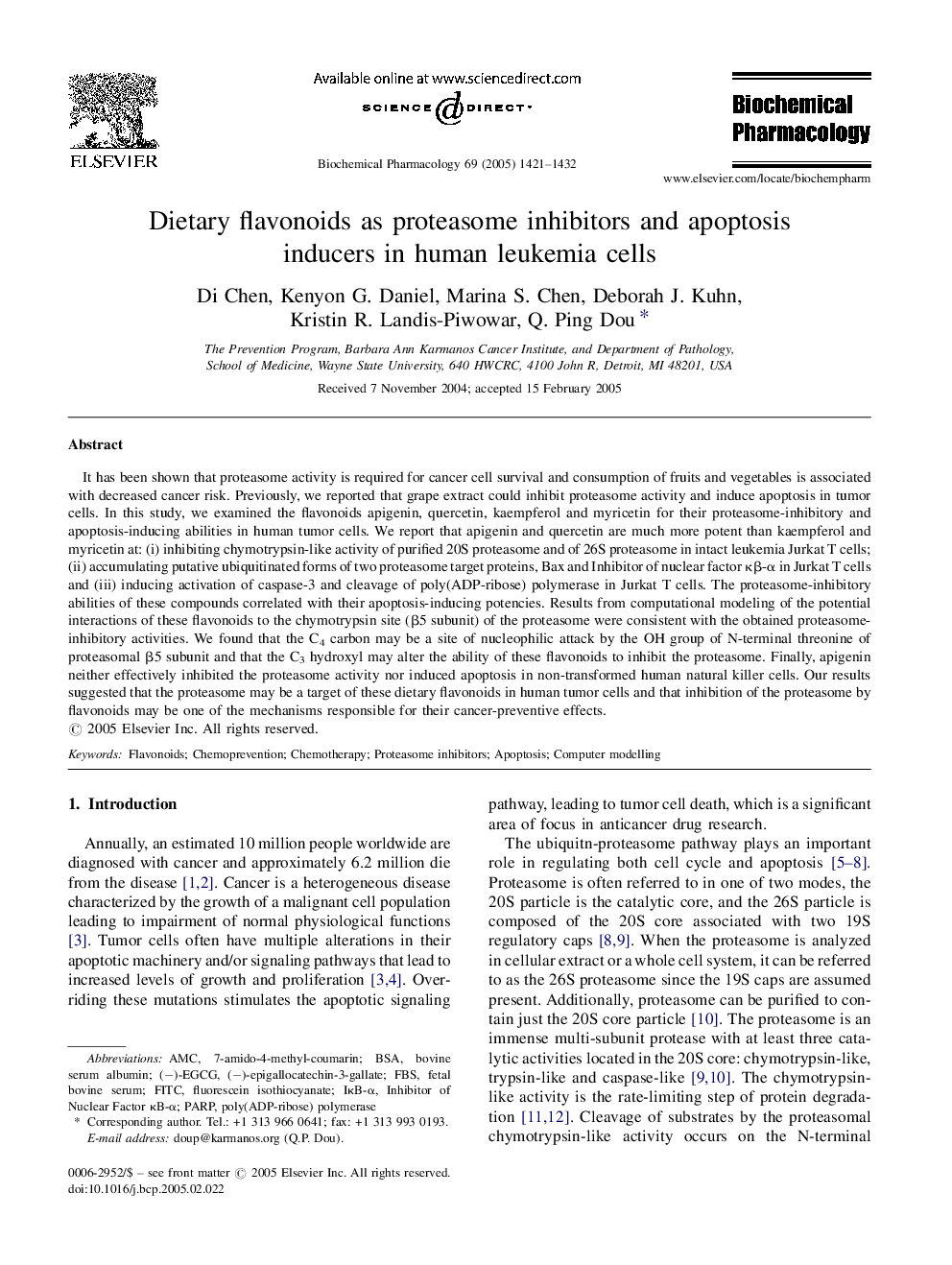| کد مقاله | کد نشریه | سال انتشار | مقاله انگلیسی | نسخه تمام متن |
|---|---|---|---|---|
| 9001656 | 1118544 | 2005 | 12 صفحه PDF | دانلود رایگان |
عنوان انگلیسی مقاله ISI
Dietary flavonoids as proteasome inhibitors and apoptosis inducers in human leukemia cells
دانلود مقاله + سفارش ترجمه
دانلود مقاله ISI انگلیسی
رایگان برای ایرانیان
کلمات کلیدی
FITCIκB-αPARPAmCFBS(−)-Epigallocatechin-3-gallate - (-) - Epigallocatechin-3-gallateBSA - BSAbovine serum albumin - آلبومین سرم گاوApoptosis - خزان یاختهایfetal bovine serum - سرم جنین گاوChemotherapy - شیمیدرمانیFlavonoids - فلاونوئیدهاfluorescein isothiocyanate - فلوئورسین ایسوتیوسیاناتComputer modelling - مدل سازی کامپیوتریProteasome inhibitors - مهار کننده های پروتئازومPoly(ADP-ribose) polymerase - پلیمر (ADP-ribose) پلیمرازChemoprevention - پیشگیری شیمیایی
موضوعات مرتبط
علوم پزشکی و سلامت
داروسازی، سم شناسی و علوم دارویی
داروشناسی
پیش نمایش صفحه اول مقاله

چکیده انگلیسی
It has been shown that proteasome activity is required for cancer cell survival and consumption of fruits and vegetables is associated with decreased cancer risk. Previously, we reported that grape extract could inhibit proteasome activity and induce apoptosis in tumor cells. In this study, we examined the flavonoids apigenin, quercetin, kaempferol and myricetin for their proteasome-inhibitory and apoptosis-inducing abilities in human tumor cells. We report that apigenin and quercetin are much more potent than kaempferol and myricetin at: (i) inhibiting chymotrypsin-like activity of purified 20S proteasome and of 26S proteasome in intact leukemia Jurkat T cells; (ii) accumulating putative ubiquitinated forms of two proteasome target proteins, Bax and Inhibitor of nuclear factor κβ-α in Jurkat T cells and (iii) inducing activation of caspase-3 and cleavage of poly(ADP-ribose) polymerase in Jurkat T cells. The proteasome-inhibitory abilities of these compounds correlated with their apoptosis-inducing potencies. Results from computational modeling of the potential interactions of these flavonoids to the chymotrypsin site (β5 subunit) of the proteasome were consistent with the obtained proteasome-inhibitory activities. We found that the C4 carbon may be a site of nucleophilic attack by the OH group of N-terminal threonine of proteasomal β5 subunit and that the C3 hydroxyl may alter the ability of these flavonoids to inhibit the proteasome. Finally, apigenin neither effectively inhibited the proteasome activity nor induced apoptosis in non-transformed human natural killer cells. Our results suggested that the proteasome may be a target of these dietary flavonoids in human tumor cells and that inhibition of the proteasome by flavonoids may be one of the mechanisms responsible for their cancer-preventive effects.
ناشر
Database: Elsevier - ScienceDirect (ساینس دایرکت)
Journal: Biochemical Pharmacology - Volume 69, Issue 10, 15 May 2005, Pages 1421-1432
Journal: Biochemical Pharmacology - Volume 69, Issue 10, 15 May 2005, Pages 1421-1432
نویسندگان
Di Chen, Kenyon G. Daniel, Marina S. Chen, Deborah J. Kuhn, Kristin R. Landis-Piwowar, Q. Ping Dou,